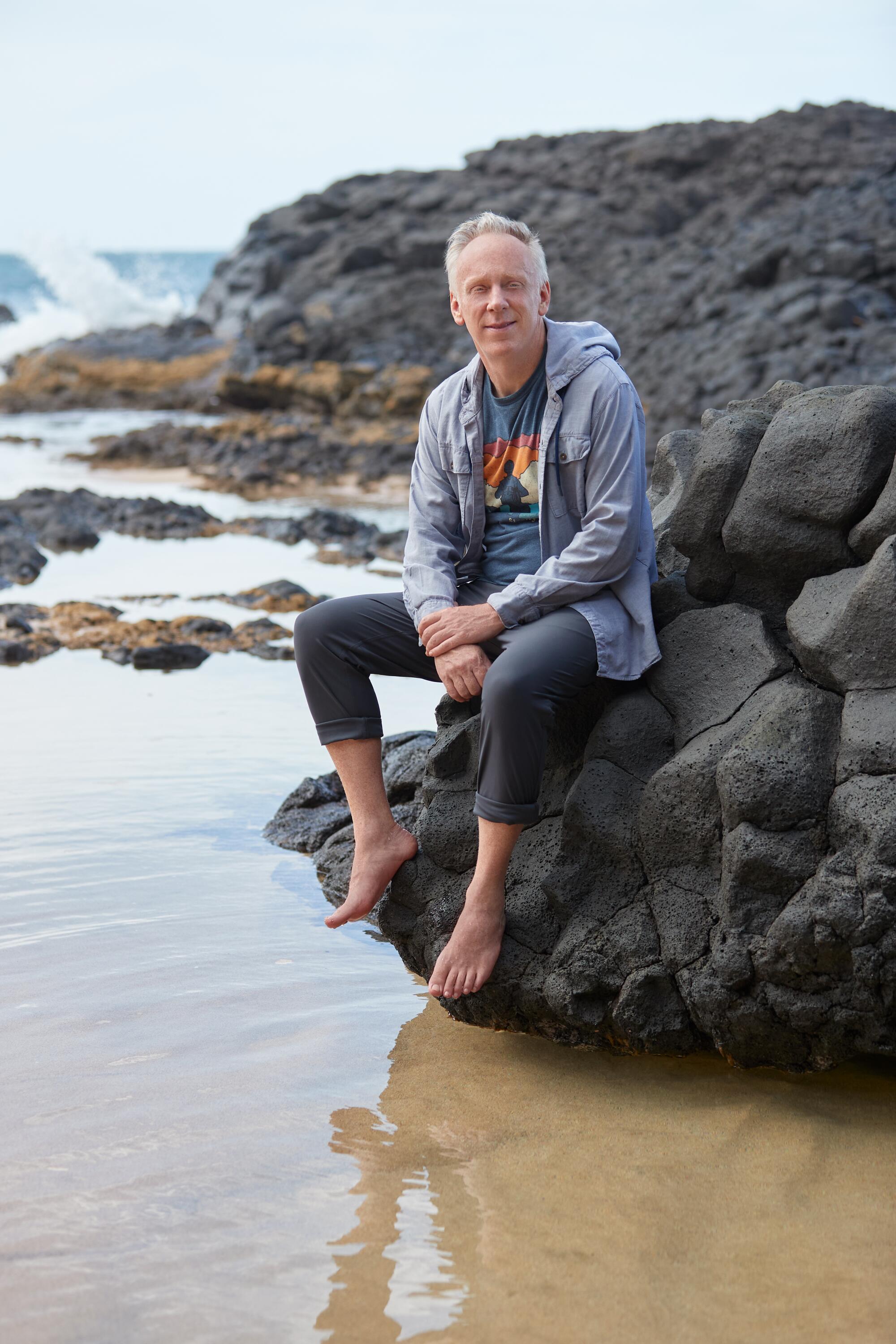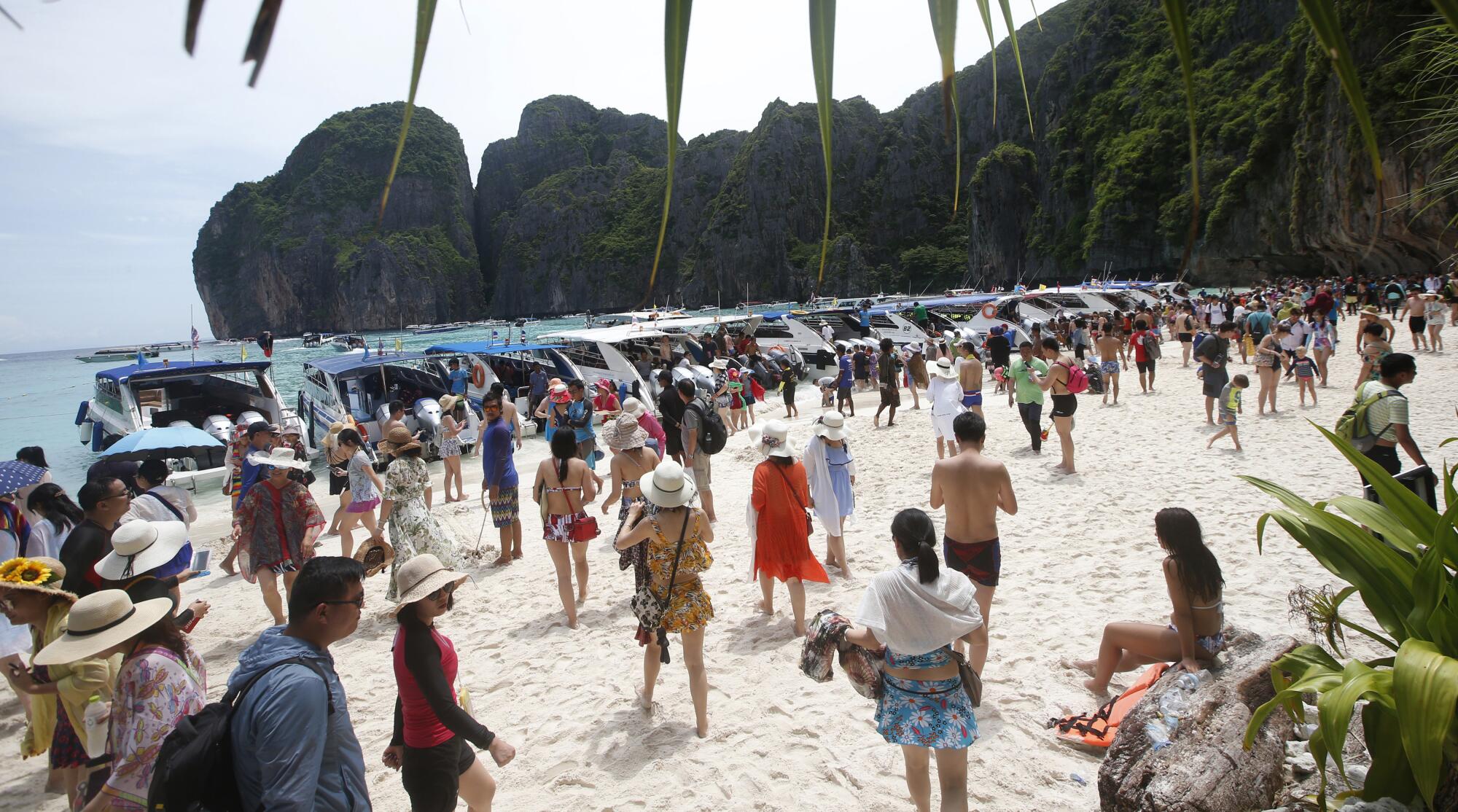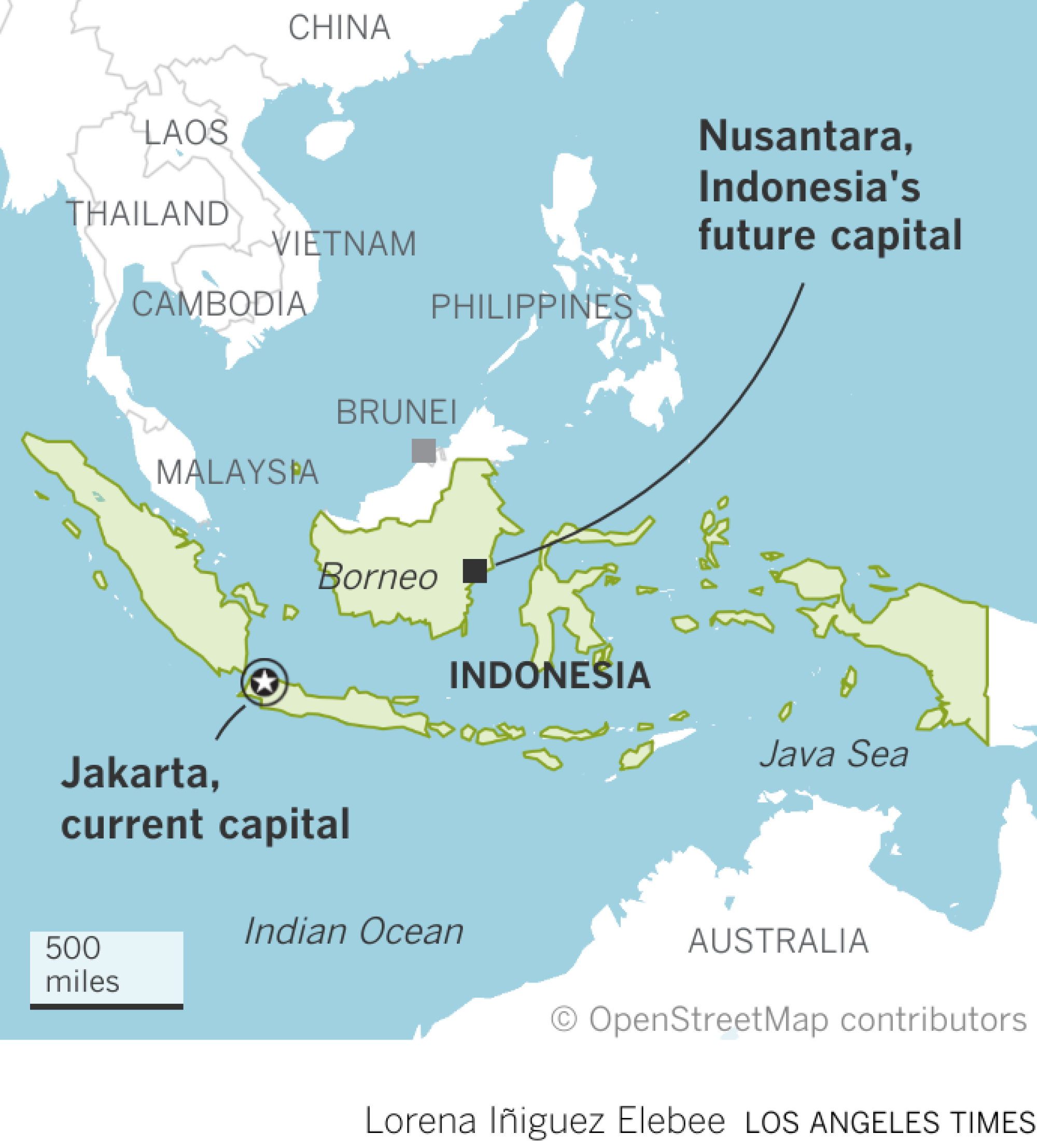KOH SAMUI, Thailand — Mike White, the creator of the HBO series “The White Lotus,” was in Thailand searching for the perfect place to film the show’s third season. His journey had led him to the island of Koh Samui and into the open-air lobby of the Four Seasons Resort, overlooking lush mountains, glimmering ocean and $9,000-a-night villas.
The hotel‘s general manager, Jasjit Singh Assi, was ready with his pitch. But it didn’t take much to persuade White.

Most of the third season of “The White Lotus” was filmed at the Four Seasons Resort Koh Samui, a 43-acre luxury beach resort that expects bookings to surge after the episodes air next year.
(Four Seasons Resort Koh Samui)
“He was quiet for a bit,” Assi recalled. “Then he says, ‘All right, this is it.’ It was as if he fell in love with it.”
Nearly two years later, the entire country is preparing to reap the benefits when the new season is released next year.
Set at a fictional resort called the White Lotus, the murder-mystery dramedy has garnered acclaim for its satirical portrayal of wealthy tourists and the working locals who cater to them. It’s also known for sparking real-life travel booms as fans of the show seek out the set locations — a phenomenon that has been dubbed the “White Lotus Effect.”
A starring role is an imitable advertisement for Thailand, which has broader ambitions to make more money from Western film productions and tourists alike. Last month, Prime Minister Paetongtarn Shinawatra met with Hollywood executives in Los Angeles and announced a plan to increase cash rebates for foreign filmmakers.
The plan, which awaits approval by lawmakers, would lift the maximum rebate from 20% to 30%, with no upper limit on total cash back.

Mike White, writer-director of “The White Lotus,” pictured in Hawaii.
(Jason Yokobosky)
“It’s amazing,” said Cod Satrusayang, head of development at Indochina Productions, a Bangkok-based production services company. “It puts us literally within the first tier in Asia, and very competitive with the rest of the world.”
With Hollywood under pressure from rising production costs, the streaming slowdown and last year’s strikes, many other countries have come courting with cheaper services and government-funded financial incentives.
“When people moved overseas for production, they realized that they could shoot a movie as well as they can in L.A. for a much cheaper rate,” Satrusayang said.
Canada, Australia and Britain are leading the way in offering incentives. But developing nations have also been getting into the game, with countries including Indonesia, Jordan and Morocco providing grants, tax rebates and cash back on local spending.
Thailand’s rebate program began in 2017. Udom Matsayawanigul, director of the Thailand Film Office, which is part of the Tourism Ministry, said that as competition to lure foreign productions has stiffened, Thailand has had to sweeten its offers to keep up.

Passengers ride in a tourist boat on the Chao Phraya River in Bangkok in March.
(Lauren DeCicca / Getty Images)
The country was reportedly able to wrest “The White Lotus” away from filming in Japan a few years ago, in part by using rebates to shave millions off the project costs.
Last year, Japan launched its own incentive program to fund up to half of qualifying expenditures for international productions, capped at $6.8 million. India increased its reimbursement from 30% to 40% last year and raised the limit from $300,000 to $3.5 million.
The Thailand Film Office estimates that every dollar of foreign film investment generates $2.80 in economic activity. The government hopes the attention will help it reach its goal of attracting a record 40 million tourists next year.
There are risks.
A 2023 Chinese action film about a kidnapping in Thailand is thought to have contributed to a decline in tourism from China. More recently, an Apple ad shot in Thailand drew criticism that it unfairly portrayed the country as run-down and outdated. Apple apologized and pulled the spot from social media.
And after the 2000 release of the film “The Beach,” starring Leonardo DiCaprio, as many as 8,000 tourists a day made the pilgrimage to the tiny islands of Koh Phi Phi, where it was filmed. They crowded Maya Bay with boats, driving away marine life and destroying coral reefs.

Thailand’s Maya Bay was so overrun with visitors after the release of the 2000 film “The Beach,” starring Leonardo DiCaprio, that it’s had to close to tourists periodically to give its coral reefs and sea life a chance to recover.
(Sakchai Lalit / Associated Press)
In 2018, the government closed the main beach in Maya Bay for restoration. It reopened in January 2022 with prohibitions on swimming and anchoring in coral areas — and periodic shutdowns for caretaking.
“‘The Beach’ was a lesson for Thailand,” Matsayawanigul said. “The National Parks Department has been mindful of this issue.”
“The White Lotus” is far from the only show to inspire travelers.
Misty Belles, vice president of global PR at Virtuoso, a network of luxury travel agencies, said “Emily in Paris” increased tourism to France, “Bridgerton” to Britain and “Squid Game” to South Korea.
But nothing quite measures up to the impact of Mike White’s creation. Bookings in Hawaii by Americans increased 25% after the first season, which was shot in Maui, according to the luxury tour operator Black Tomato. Bookings for Sicily tripled after Season 2, which was set in the town of Taormina, as travel came roaring back from the COVID-19 pandemic lockdown.
“The location almost becomes a character in and of itself,” Belles said.
She said Thailand is already seeing an increase in bookings in anticipation of Season 3, which also includes scenes in Bangkok and Phuket.
On the island of Koh Samui, home to about 70,000 Thais, the Four Seasons is enjoying record-high occupancy rates amid a boom since the height of the pandemic, according to Assi, the general manager. He said he expects next year to be even bigger.
“Not everybody knows Koh Samui as a destination,” he said. “The resort is now going to be on the global stage, and there’s an excitement to that. We want people to come.”
While foreign visitors account for about two-thirds of tourism revenue in Thailand, excitement about “The White Lotus” is also growing among domestic tourists, thanks to the casting of Lalisa “Lisa” Manobal, a Thai member of the K-pop group Blackpink.
Even outside of the luxury resort’s private infinity pools, two-person bathtubs and 24-hour butler service, preparations for an expected tourism boom are underway.
Ratchaporn Poolsawadee, president of the Tourism Assn. of Koh Samui, said Bangkok Airways will increase the number of daily flights to the island from 50 to 73. With tourism accounting for more than 90% of the island’s economy, local authorities are seeking government approval to expand the airport, ferry transportation, waterworks, electricity network and roads.
“They want to bring in more people, so we need to improve our supply side,” he said. “I see a lot of places are starting renovations for the next year as well.”
Kanokkorn Lamlert and Patrick Moukarzel, owners of the the Thai Tapas restaurant, said they began feeling logistical strains last year as tourism rebounded after the pandemic.

Kanokkorn Lamlert and Patrick Moukarzel, center, owners of the Thai Tapas, with “White Lotus” cast members, from left: Francesca Corney, Aimee Lou Wood and Walton Goggins. “The White Lotus” superfans started visiting their restaurant this year after seeing the actors dine there on social media.
(Kanokkorn Lamlert)
When the local seafood market sold out, they had to drive 45 minutes for sea bass or shrimp. Hotel and food prices have risen, and the roads have become more prone to traffic jams, they said.
However, the economic payoff of a tourism boom in Koh Samui would be felt across the nation, Moukarzel predicted.
“When you come here, you never just come to Samui,” he said. “Bangkok will also benefit. Some people will do one week in Chiang Mai. They will go back and say, ‘We’ve been there because of “The White Lotus”; you have to go.’”
Already the restaurant has welcomed about a dozen superfans of the show after they spotted the cast and crew dining there on social media.
The restaurant owners said they are planning a marketing campaign around the premiere of the season, which includes a scene shot on the street outside their restaurant. One idea is to introduce a new Thai dish made with lotus root, stir-fried mushroom and slow-cooked beef.
They will call it “The White Lotus Beef Ribs.”
Special correspondent Poypiti Amatatham in Bangkok contributed to this report.



